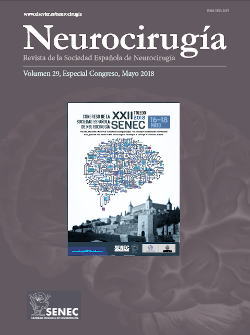C0062 - DECOMPRESSIVE CRANIECTOMY IN MALIGNANT MIDDLE CEREBRAL ARTERY INFARCTION: A SINGLE CENTER RETROSPECTIVE ANALYSIS
1Hospital de Braga, Braga, Portugal. 2Escola de Medicina-Universidade do Minho, Braga, Portugal. 3Serviço de Neurocirurgia, Hospital de Braga, Braga, Portugal.
Objectives: Malignant middle cerebral artery infarction (mMCAI) refers to infarctions of either the middle cerebral or the internal carotid arteries affecting the middle cerebral artery’s territory which may cause life-threatening, space-occupying brain edema. This event occurs in up to 10% of supratentorial infarcts. Even with intensive medical treatment, mortality is as high as 80%. Decompressive surgery has been used as an alternative treatment modality in these patients, having shown a significant reduction in mortality. However, it is still uncertain whether a benefit in functional outcomes is achieved in every patient and what influences that outcome.
Methods: A retrospective analysis of all patients submitted to decompressive craniectomy for mMCAI in a single center, since 2008 to July 2015, was performed in order to evaluate decompressive craniectomy and to assess what factors influence patients’ outcome. Outcome was evaluated through the modified Rankin Scale score 3 months after surgery.
Results: The proportion of patients that survived without severe disability was 62.1%, which is in line with values reported by similar studies. The mortality rate was 14.7%, much lower than mortality reported in patients submitted only to medical treatment in other studies. 70% of patients under 60 years of age had an acceptable outcome, against 52.9% aged over 60. Mortality in patients with a diagnosis of atrial fibrillation was 33.3%, against 11.1% in the other patients. An unfavourable outcome was found in 55% of hypertensive patients, as compared with 22.2% in non-hypertensive patients.
Conclusions: Decompressive craniectomy was shown to be a better alternative than intensive medical treatment in patients with mMCAI concerning survival, and showed promising results regarding to functional outcomes. Several factors showed a possible association with patients’ outcome, which warrants further investigation in future studies.







